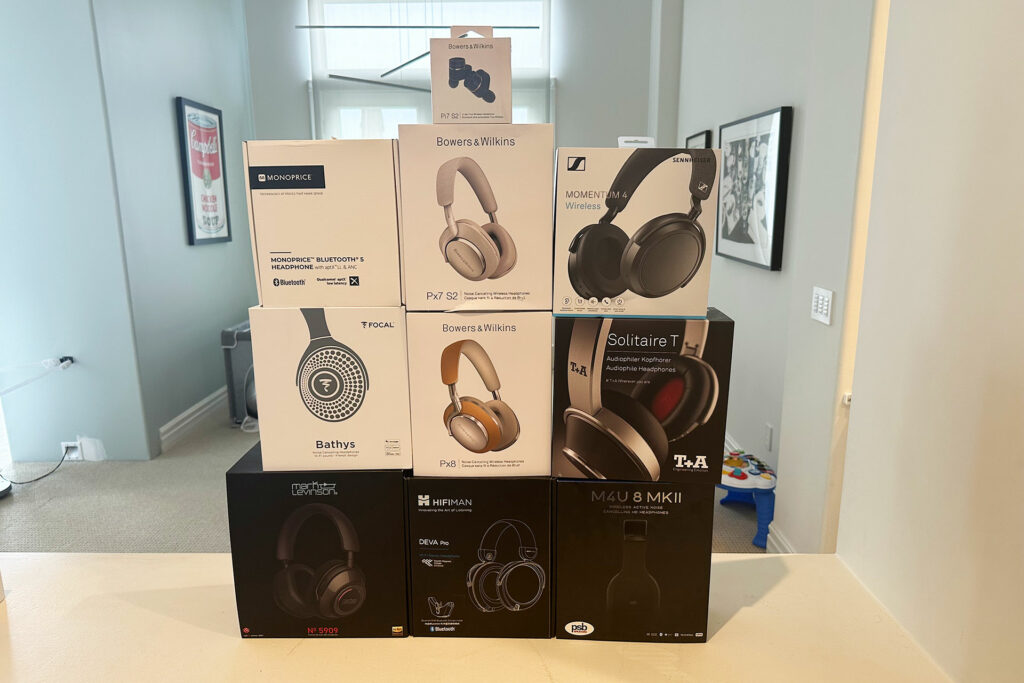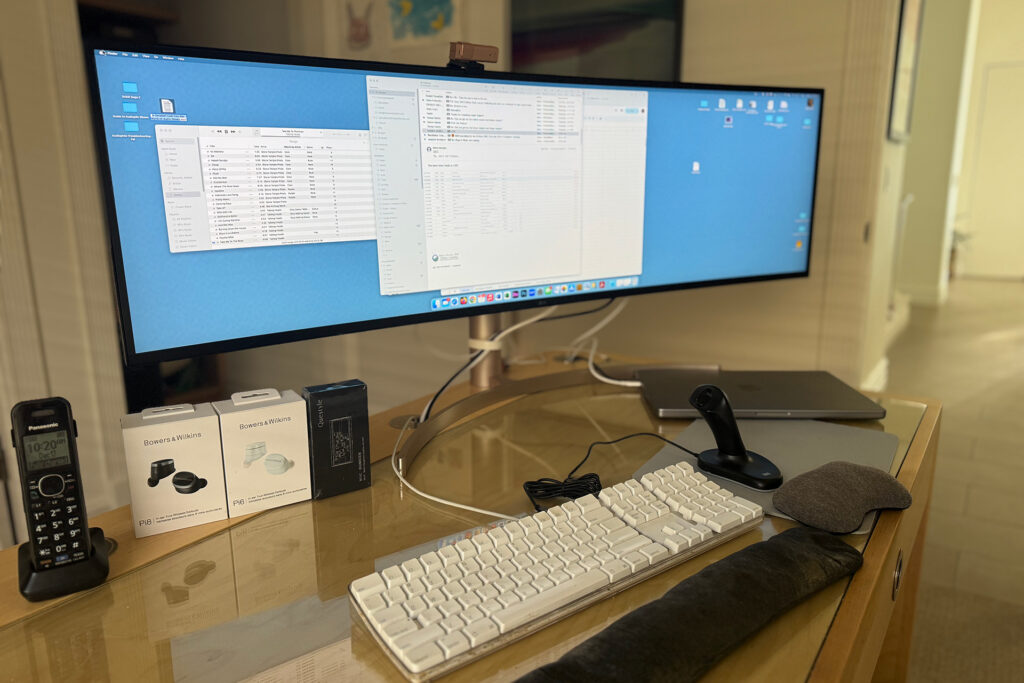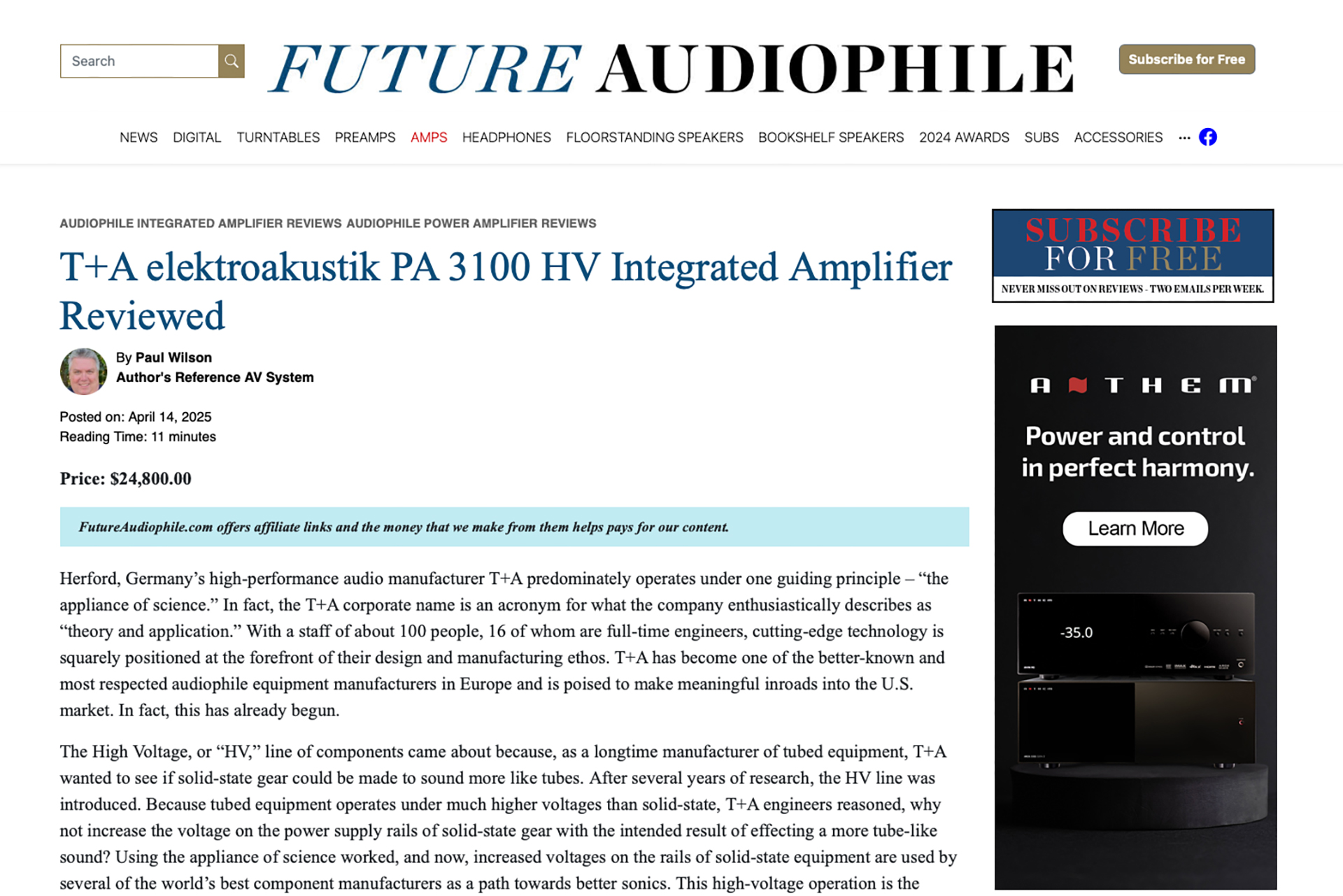In a few short years, FutureAudiophile.com (learn more here) has become the fastest-growing audiophile publication in the English-speaking world. By the two-and-a-half-year mark, FutureAudiophile.com gets more than half of the traffic of the leading establishment audiophile publication online. That readership is attained with literally one-twentieth of the volume of reviews. FutureAudiophile.com reviews more top-level components than any other audiophile publication in any media. That’s kinda how we roll.

The FutureAudiophile.com Editorial Staff
The editorial staff at FutureAudiophile.com is second to none in the audiophile business today. Like a championship sports team, our staff is ever-changing and always evolving. Many of our key players are signed long-term and have impressive consumer electronics industry tenures. FutureAudiophile.com’s editorial “special sauce” is our ability to present audiophile news and reviews from voices that represent where the hobby is going more than where it came from.
Our editorial team includes OG “original gangsta” audiophiles like Paul Wilson, who was our editor, back in the day, when we owned AudiophileReview.com. Mike Prager is the former president of the Pacific Northwest Audiophile Society, a lifelong biologist with a Ph.D. and degrees from M.I.T, who is an unabashed audio enthusiast. By day, Brian Kahn is a partner at Chapman Glucksman, a major West Los Angeles law firm and, in his spare time, he is the most tenured writer on our staff, having worked with us at AVRev.com, HomeTheaterReview.com and AudiophileReview.com. Jim Swantko has a degree in electrical engineering and works with the world’s most sophisticated 5G cellphone networks. Like Kahn, Swantko is a Gen X lover of technology and luxury. Swantko’s system today includes CH Precision, Weiss Engineering and Rockport gear. Thus he is, in effect, the next generation of the very high-end audio consumer.
We have plenty of Millennial audiophile reviewers on our staff, too. Eric Forst has a Master’s Degree in audiology and works in the health care space, specifically teaching stroke victim patients to speak again. Andrew Dewhirst is an executive at an educational tech firm based in Ontario, Canada, who is highly focused on audiophile value. Nasim Abu-Dagga is our first Gen Z audiophile writer on staff. As a young man in his 20s, Abu-Dagga just bought his first home. He has a degree in electrical engineering, which allows him to work in aerospace. Abu-Dagga focuses on new audiophile technologies and audiophile value. He also races Porsches in his spare time.
Jerry Del Colliano is FutureAudiophile.com’s founder, editor and publisher. Del Colliano has a degree in Music Industry from the University of Southern California’s Thorton School of Music. He started AVRev.com while a junior at USC with an $11,000 commission from selling a Cello Reference system costing over $300,000. Del Colliano was once the top Wilson Audio salesman when working at the legendary Christopher Hansen Ltd. retailer in Beverly Hills back in the early 1990s. Del Colliano built and sold AVRev.com to Internet Brands in 2008. He then spent another decade building HomeTheaterReview.com and AudiophileReview.com into million-dollar properties, which he sold in December, 2019 to JRW Publishing. When his non-compete ended, he decided to come back to his passion, audiophile music playback systems, and start a new publication. That’s how FutureAudiophile.com got launched in 2022. Del Colliano is an active voice on FutureAudiophile.com today and sets the tone for the publication and its staff. Del Colliano attends many of the most meaningful audiophile trade and consumer shows around the world. He has been published as a writer and photographer in The Huffington Post, Forbes, LATimes.com, CBS News, ABC News, Audioholics.com and many other media outlets. To learn more about Del Colliano’s editorial projects, check out his Jerry Del Colliano Muckrack.com profile.

What is FutureAudiophile.com’s Editorial Voice?
The voice of FutureAudiophile.com is perhaps its most unique and powerful editorial element. FutureAudiophile.com is an accessible, easy-to-read online magazine about stereo equipment and the audiophile hobby. The voice of the publication strives to be authoritative, expert, engaging and trustworthy, yet also conversational and lacking the use of bloated acronyms and industry jargon. Clichés such as car analogies are used sparingly. Direct, to-the-point advice is given like one audiophile opening up to another with heartfelt conviction.
The thing that makes the content most powerful at FutureAudiophile.com is that our staff is likely a lot like you. First and foremost, they love the audiophile hobby. They buy and sell audiophile gear like you do. They deal in real-world value, not “paid content” influences (learn more about our ad policies here). They walk the audiophile walk and talk the audiophile talk.
Audiophile voodoo and/or snake oil has no place at FutureAudiophile.com!
Science, facts and measurements are respected here, as are differing opinions and unique outlooks on our hobby.

What is the FutureAudiophile.com Editorial Process?
We are scheduled to review 102 audiophile components per year. Roughly speaking, we publish two audiophile reviews per week, thus about eight to 10 per month, depending on how the calendar falls. We also publish one Featured News Story, normally on Wednesdays, that tries to offer insight, advice, news or analysis of trends, technologies, demographics and so much more as it relates to the world of audiophilia. For example, when Bose pulled McIntosh from its national distribution in hundreds of Magnolia stores, you heard about it from us first.
So here is how the audiophile editorial sausage is made …
- We request or procure a review sample. This can be directly from an audiophile manufacturer, through a PR firm, or sometimes components that our staff has purchased, borrowed or currently own.
- Do you have to “pay to play” in order to get a review at Future Audiophile? Uh … No. While pay-to-play is one of the biggest complaints about some of our editorial competition, there is no way to buy a review with FutureAudiophile.com. Audiophile manufacturers also don’t owe the publication anything for a review in terms of quid pro quo, thus an audiophile company doesn’t need to buy ads to get a review from FutureAudiophile.com. We are very proud of this part of our editorial model.
- What companies are not allowed to be reviewed in Future Audiophile? Respectfully, we have our banned list, and there are currently 14 companies on said list, which is well-archived (and not to be published here, other than the fact said list exists). How do you get on the banned list? Commit a felony in our industry (like defrauding a children’s charity in the name of the hobby). Companies who treat us without a modicum of professional respect can eventually get banned on the basis of the concept that if they will treat a media outlet with such reckless abandon and arrogance, how will they treat our readers if they bought their gear? We’d rather not find out, and politely encourage these companies to get ink elsewhere.
- Why are there more positive reviews than negative ones in FutureAudiophile.com? First off, there isn’t that much truly bad gear in the audiophile business in the 2020s. Secondly, we don’t seek garbage, even if negative reviews ignite online or social media user engagement. We have very strong audiophile industry ties and generally can get the best of the best of audiophile gear with relative ease. We cover the upside AND the downside of every component that we review, so no matter how awesome said component presents itself, we highlight the good with the bad. Editorial balance and transparency are the hallmark traits of the FutureAudiophile.com editorial policy.
- How long does it take to get a component reviewed in FutureAudiophile.com? Without question, FutureAudiophile.com is the fastest professional publication in the audiophile editorial world when it comes to how long we take to complete the audiophile editorial review process. There are some establishment as well as online media sources with diva reviewers who hang on to review samples for much longer than a year. That is absurd, in our view. We tend to get our reviews done in a matter of a few months. In some cases, we can get a full professional review done in a few weeks, but that is fast.
- Who edits Future Audiophile’s reviews? Del Colliano, our publisher, edits all of our reviews. Wilson often also reads them before they go off to Abbie Bernstein, our long-time proofreader/copy editor. Bernstein is an accomplished writer of nonfiction books about film and television, as well as a Hollywood screenwriter who’s been represented by A-list talent agencies.
- Are FutureAudiophile.com reviews fact checked? Absolutely. Nearly all FutureAudiophileReview.com reviews are given to the manufacturer for their team to review the facts. NOTE: a fact check doesn’t mean that the manufacturer gets to edit opinions, because they absolutely do not! The concept of getting every fact perfectly right in 102 featured (component) reviews per year is impossible in practice, but a key editorial goal nonetheless. If we catch a mistake after publication – we will make corrections, as well as notes that we modified the review. Editorial integrity and transparency is of the utmost importance to FutureAudiophile.com.
- What happens if an audiophile company won’t send FutureAudiophile.com a review sample? This is a complicated situation that rarely happens, but it has come up. Sometimes it is logistically easier or more cost-effective to review audiophile components in a retail, residential or non-reviewer listening environment, due to costs, logistics, and so on. In other cases, such as with some Chi-Fi products, we have to take a page from Consumer Reports and pay to procure the review sample. The 1977 Supreme Court case of Bose vs. Consumer Union sets a pretty clear and relevant standard that, under the First Amendment, we all have the right to share our opinions, including on products reviewed that were purchased.
- What is the FutureAudiiophile.com editorial policy on photography? For starters, we ask all of our reviewers to take their own photos of review gear. We know Google and AI Search use bots to see if a photo is unique. We try to provide as many unique photos for our audiophile reviews as possible. In nearly every review we publish, we generally have a mix of reviewer photos, studio photos and professional lifestyle and/or installation photos. We NEVER swipe images from the Internet without permission. When using stock photography outside of the scope of a manufacturer, we exclusively use paid or royalty-free images. We do our best to understand modern copyright laws and do everything in our power to follow them perfectly in terms of our photos used in our audiophile reviews.
Hopefully, this level of editorial policy and overall transparency explains how reviews are created and published at FutureAudiophile.com. We do our best to provide as much free, professional and insightful comment to audiophile enthusiasts all over the world, and this is our current process.


